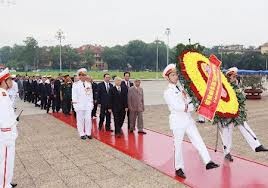(VOVworld)-Ho Chi Minh City held a solemn ceremony on Sunday to mark the 123rd anniversary of President Ho Chi Minh’s birthday. Exemplary individuals and organizations in the movement to learn from President Ho Chi Minh’s moral example were honored at the event. Permanent Deputy Secretary of the city’s Party organization, Nguyen Van Dua, praised President Ho Chi Minh’s merit and his whole life career dedicated to national liberation and unification. He said that President Ho Chi Minh set a bright example leading generations of Vietnamese people: “The Party and people in Ho Chi Minh City pledge to follow his great path forever. We will promote revolutionary tradition, unity, creativity and staunchness in the socialist road. We will overcome challenges to maintain social stability, economic restructuring and ensure sustainable growth of good quality, safeguard national security and build up a modern municipal city.”
 |
| Practical activities to celebrate President Ho Chi Minh’s 123rd birth anniversary (Photo:thanhnienviet.vn) |
Dozens of thousands of people laid wreaths at Ho Chi Minh Mausoleum in Hanoi while the national museum of history held a workshop for students to discuss Uncle Ho’s role in promoting youth in national liberation and the current national development and international integration. On Saturday, the Ministry of Public Security held a ceremony to honor 171 young police officers in their movement to follow President Ho Chi Minh’s teachings.
In the central province of Nghe An’s home place of President Ho Chi Minh in Nam Dan District, the Youth Association and local health workers launched a campaign to care for community health and improve social welfare. The central province of Quang Nam held a ceremony to begin the construction of a statue in honor of Vietnamese heroic mother. It reflects the people’s tribute to heroic mothers in national construction and defense.
A ceremony has been held to mark the 90th anniversary of President Ho Chi Minh’s arrival in the Soviet Union in 1923 to follow the international communism movement. Evgheni Kobelev is a Vietnamese studies expert: “When Ho Chi Minh came to the Soviet Union, he was a member of the French Communist Party in charge of Indochina. He was determined to liberate Vietnam from French colonialists. When he studied in the Oriental University and operated at the International Communism’s Indochine Committee, Ho Chi Minh developed a comprehensive plan for national liberation. This paved they way for the establishment of communist parties in Indochina.”
Kobelev set up a Vietnamese space in his home with a statute of Ho Chi Minh and lots of books about the President and Vietnam.
The Vietnamese Embassy in Beijing held a gathering for Vietnamese and Chinese students where Ambassador Nguyen Van Tho praised efforts by President Ho Chi Minh and Chinese President Mao Tsetung in fostering bilateral relations. Professor Chen Kuiyuan, president of the Chinese Academy of Social Sciences, said he learned Vietnamese because of his love and respect for President Ho Chi Minh: “A senior Chinese delegation visited Vietnam in 1962 and President Ho Chi Minh participated at a banquet when I met him the first time. He was a great leader of Vietnam and a close friend of Chinese people.”